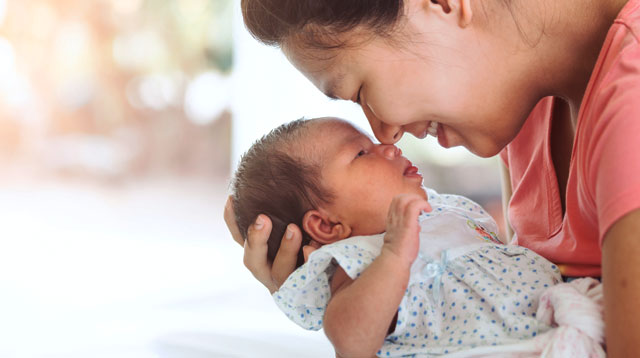
Image credit: iStock
It is equally important to take care of your body now that baby is out in the world! The time after delivery is known as the postpartum period, and this is an entirely new phase of physical and emotional change you probably weren’t prepared for.
Here’re a few things you can expect to happen and what you can do to ensure a smooth and speedy recovery:
1. Physical And Emotional Changes
Even after giving birth, your body continues to undergo changes as your uterus starts to shrink. You will experience some painful contractions similar to period cramps. Especially so when baby latches on to breastfeed.
What should you do?
Eating nutritious meals with lots of fluids and getting enough sleep are some ways to help your body recover. Easier said than done, so get your partner involved in baby duty while you get some shut eye!
On the emotional front, you will inevitably feel overwhelmed as you’re still sore from delivery, and the lack of sleep will affect your mood. At this point, it is important to take note that you are not slipping into postnatal depression. This can develop during the first 6 months after birth and can last over a year if left untreated.
Negative emotions experienced after pregnancy should not be taken lightly. If you are not feeling yourself, don’t be afraid to seek help!
2. Breast Engorgement
Your breasts will swell with milk a couple of days after birth. Your nipples will also feel sore from breastfeeding. While this is totally normal, it can be very uncomfortable. Good news is – this feeling will improve with time! Your milk supply will regulate over time to suit baby’s need and this discomfort will get better as your body adjusts.
What should you do?
Feed baby regularly to ease engorgement. If your breasts still feel full after baby latches, try pumping to empty as much as possible. Applying a warm compress to your breasts can help as well.
3. Discomfort From Delivery Stitches
Most moms will have stitches done after delivery from vaginal tear, an episiotomy and of course, if you had a caesarean birth. Regardless of why you needed stitches, the most important thing is that you understand how to care for them and help them heal.
What should you do?
4. Weight Loss
After giving birth, you will lose about 4.5kg right away and a little more as body fluid levels decrease. Don’t expect or try to lose additional pregnancy weight right away though! Gradual weight loss over several months (some mothers takes a year) is the safest way, especially if you’re breastfeeding.
What should you do?
In the early postpartum weeks, concentrate on staying healthy. Eat nutritious foods, get enough rest and gradually return to exercising. Walking with baby in a carrier or stroller is a good way to start. Don’t put too much pressure on yourself, or compare yourself to other mothers who seem to snap right back into shape (urgh, annoying I know..).
5. Sex After Pregnancy
After a natural or caesarean delivery, your body requires time to heal before having sexual intercourse. Getting yourself in the right state of mind to enjoy sex might be a challenge as you might face issues like fatigue, bleeding, pain and changes in mood and hormone levels. It is completely normal to feel like you’re not ready for sex and it is important to give yourself time.
What should you do?
As eager as he is to jump back into it, talk to your partner to ensure that he is on the same page as you. Getting back to a normal routine requires good hydration, a healthy diet and regular exercise. With patience and proper planning, you will get your mojo back eventually!
For more pregnancy and childcare tips, subscribe to our mailing list and like us on Facebook, to receive new articles for mummies like you every week!
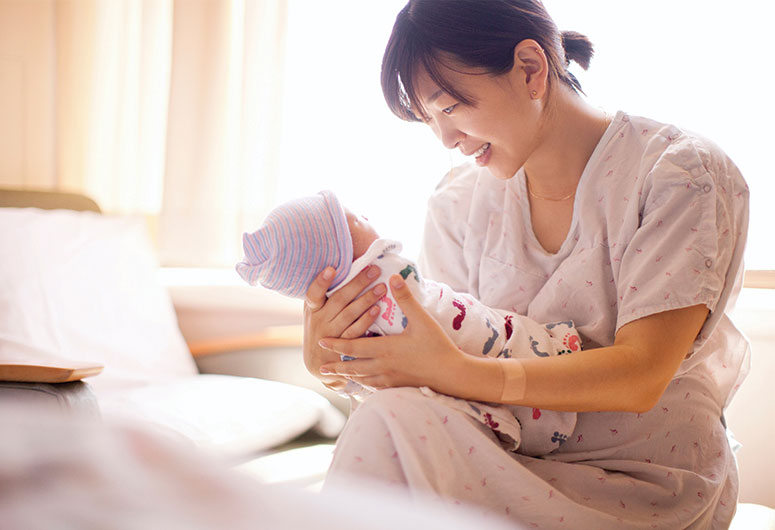
Post-delivery confinement is deep rooted in our Asian cultures. The logic behind is that both mother and baby need to rest. The little one needs to be protected from infections whereas the mother who has been through the exhaustion of childbirth needs to rejuvenate.
It’s said that, if confinement is well done, the mother is healthy and there will not be any future health repercussions. While confinement is important, it’s even more important that we get the myths busted and follow the facts!
Here are 10 Confinement facts and myths:
1. No baths allowed!
Myth: No head baths during this period. This will prevent wind from entering mother’s body through her scalp. Such wind will cause headache.
Fact: During confinement there is excess sebum produced. If there’s no hair wash, there are more chances of infection due to blocked hair follicles. Bathing in water with Chinese herbs which are easily available, is known for preventing wind from entering body. Pour hot water over herbs; let it cool down to the desired temperature and bath in the same.
2. Cannot drink water
Myth: Don’t drink water during this period. It will cause water retention.
Fact: You need to be well hydrated for producing enough breast milk. Negotiate with your confinement nanny on having more warm or hot liquids.
3. You have to drink a shot of alcohol everyday
Myth: Alcohol is an important aspect of confinement food Singapore. Mother’s body is cold after blood loss and alcohol will warm her up.
Fact: Alcohol is secreted in breast milk and it passes onto your baby; hence it should be avoided.
4. You must eat a lot of herbs
Myth: The more the herbal supplement you include in your confinement diet, the better it is. It strengthens your body.
Fact: Health profile differs from person to person. Incorrect intake of herbal remedies may cause more harm than benefits. Research and consult your doctor; however, avoid cooling foods like cucumber and watermelon.
5. You cannot sleep with the air-con on and no standing directly infront of the fan
Myth: No to fans or air conditioners! It makes way for wind during this time.
Fact: Comfort and rest play a major role in recovery. When the temperature is hot, you and your baby cannot sleep well. Moderate AC or fan will cause no harm.
6. You must eat a lot of 'heaty' food
Myth: Confinement dishes should be made of ‘heaty’ foods like old ginger, sesame oil, vinegar and meat only.
Fact: On the contrary, your menu should comprise of a balanced diet. The baby gets what you eat. Your baby’s vital organs are growing and they need a constant supply of nutrition.
7. You cannot touch cold water
Myth: Never touch tap or cold water during confinement. It will cause joint pains in later life.
Fact: Singapore water is not that cold anyway! This particular confinement practice may be followed in countries where water is really cold.
8. Do not go outdoors
Myth: Never step out during confinement! Wind will affect your bones.
Fact: Excess exposure to cold winds may affect your health, which is unlikely in Singapore. On the contrary, no exposure to sun and fresh air may cause adverse health effects.
9. You cannot do any reading
Myth: Reading will weaken your eyes during confinement. Blood loss weakens liver which in turn weakens your eyes. Reading will further strain your eyes.
Fact: Including Chinese wolfberries into your diet will help you strengthen your liver and eyes. While good amount of sleep is crucial for the new mother, after a couple of weeks if you are comfortable, engage in some interesting reading as long as you want. It will refresh you.
10. Wear socks at all times!
Myth: Feet should not touch the floor, it makes you susceptible to cold. Always wear socks.
Fact: This may be true in cold weather. As this is quite easy, you may follow this and keep the negotiations reserved for other myths like no bath.
Pregnancy and Baby Singapore provides you with the latest news and practical tips to help you in your parenting journey. For more tips on your pregnancy and baby in Singapore, subscribe to our mailing list and like us on Facebook, to receive new articles for mummies like you every week!
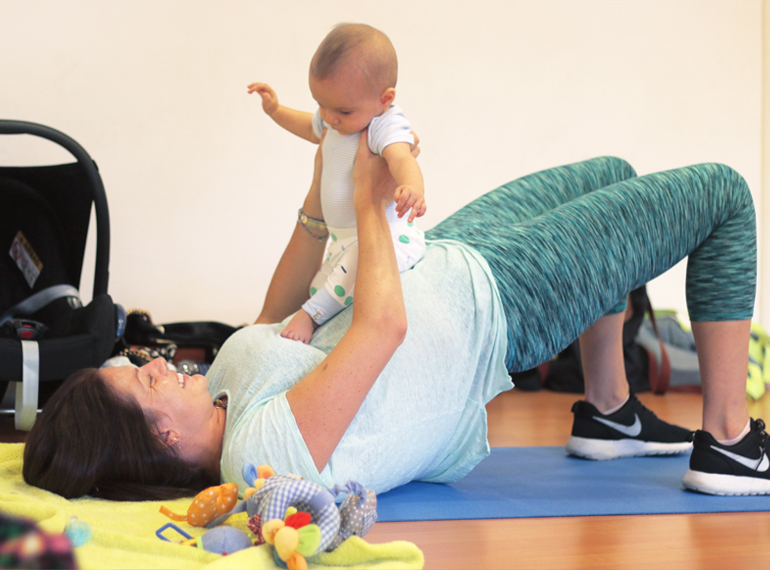
Image credit: Tangram Wellness
Okay, you’ve given birth and it’s a healthy baby – congrats! You may want to take it easy and rest (and you really should), but doing some light exercises does have its benefits. You’ll feel more energetic and happier, and your strength and stamina will get a boost!
When can I start exercising after giving birth?
For mummies who’ve done a caesarean birth, you’ll need to wait for at least six weeks for your body to heal and recover – you’ll have a postnatal check-up scheduled after that six week period as well, so you should check with your health care practitioner if you’re able to begin working out.
For mummies who’ve gone through a vaginal birth without complications, and have been exercising consistently before and throughout their pregnancy, they can start out with light exercises after they feel they’re ready to.
However, some things that’re really common amongst mums who’ve just given birth are the aches in their bodies and bones, plus the fatigue that sets in – those are signs that you shouldn’t push yourself while exercising.
Hormones like relaxin that’re produced during pregnancy to help relax ligaments in the pelvis and widen the cervix can last for up to six months in your body. This means that your joints will be a bit weaker for a while, and you shouldn’t do strenuous, high-contact activities or even strength/resistance training.
Even if you’re mentally ready to start exercising again, pay attention to the physical needs of your body too; don’t go too hard while you’re working out.
The Do’s and Don’ts of Exercising Early On
Do…
Don’t…
How important is it to lose extra weight after giving birth?
The most important thing to consider when losing weight is if you want more kids. Being overweight could increase the risk of complications in future pregnancies, which includes:
If you’re not planning on having more kids, keeping your weight under control and staying healthy still has its benefits!
Firstly, you’ll continue to remain healthy as your child grows up – your energy levels will be improved (it gets quite a bit more tiring as they get older), you’ll be reducing your risk of diabetes and heart disease too.
Secondly, exercise helps you both physically and mentally. We’ve already talked about the physical parts of exercise, so let’s take a look at the mental benefits.
The mental boost that you get from exercise is partially from being able to take control of yourself (via the level of your fitness). You’ll witness and experience, first-hand, the change that your body’s going through, which is a direct result of your effort and hard work!
For more pregnancy and childcare tips, subscribe to our mailing list and like us on Facebook, to receive new articles for mummies like you every week!

Image credit: Gurl
You might not be prepared for the effect of post-pregnancy hormones on your once-glowing pregnancy complexion.
Some mothers experience drastic skin changes once they’ve delivered their baby. And it definitely does not help that the sleep deprivation will be evident through the dark circles round your eyes!
Post-pregnancy hormones can show up at the most annoying times, but there are ways to minimise and correct these problems! Here are the safest and most effective treatments:
1. Melasma
Cause: UV exposure, genetics and elevated estrogen and progesterone levels combine to create a darkening of skin on lighter-toned faces or lighter patched on darker skin.
What it looks like: Otherwise known as the “mask of pregnancy”, pigment typically collects around the cheeks, forehead, eyes and sometimes around the mouth.
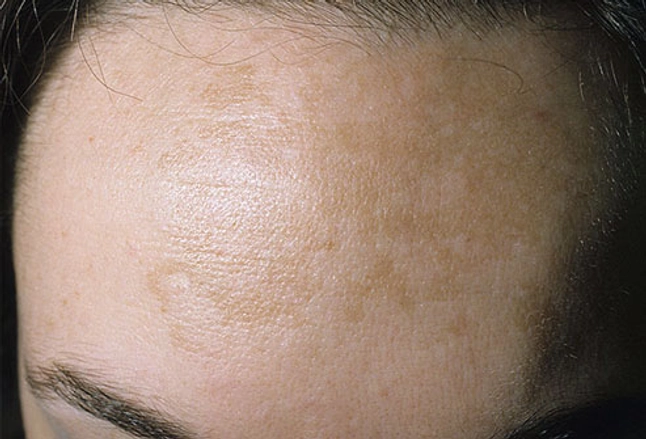
Is it permanent? While some of the hyperpigmentation will fade once you’ve delivered, the discolouration never goes away completely.
Treatments: Apart from spamming your face with sun block, you’ll need to reapply consistently if you’re exposed to the sun often. Or even if you’re just sitting near a window. Products containing ingredients like kojic acid (speak to your doctor if you are breastfeeding), rice bran and vitamins C, E and A (safe for nursing mothers) in lower concentrations will help brighten and refresh your complexion.
2. Hormonal acne
Causes: High levels of progesterone and estrogen fluctuations lead to increased sebum production and clogged pores.
What does it look like: It typically affects the neck and lower area of the face and often presents itself as raised red bumps that can be painful to the touch.

Is it permanent? It can disappear within a few months.
Treatments: Products with benzoyl peroxide, to penetrate clogged pores and extracts impurities, as a safe option during and after breastfeeding. But for women experiencing painful, cystic acne that won’t go away, visiting a dermatologist is your best bet.
3. Facial spider veins
Cause: Increased blood circulation and hormone levels highlight facial veins in a spider-like effect.
What they look like: Small reddish blood vessels branching out around the face (commonly around the nostrils and cheeks), neck and upper body.

Is it permanent? Many women notice a diminished effect four to six months post-birth, while some may need to seek treatment to lessen their appearance.
Treatments: Try red raspberry extract, a bioflavinoid- and plant hormone-rich ingredient that works to strengthen vessels (and it’s safe if you are nursing). She also advises using emollients like shea butter and olive or plant oils to keep skin soft.
4. Flaky, dry skin
Cause: Hormonal changes can sap skin of lipids during and immediately following pregnancy, leading to moisture-sapped patches on the face.
What it looks like: Sections of dry, red and somewhat leather-like skin, on cheeks, nose and mouth.
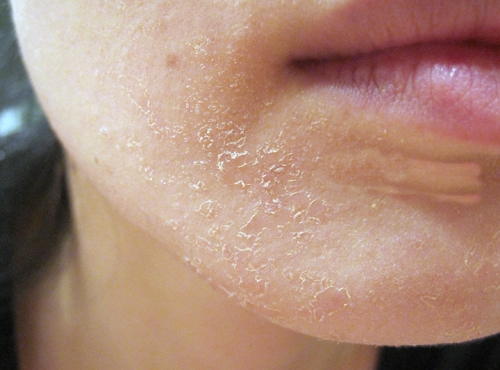
Is it permanent? Because skin is lacking hydration, the sooner you restore moisture levels, the sooner your complexion will return to normal.
Treatments: Reduce dryness and inflammation is by using mild cleansers and moisturising effects. Read the ingredient label to make sure they’re fragrance-free, additive-free and non-comedogenic, and always protect skin from damaging UV rays with broad-spectrum protection. For especially raw areas, use a hydrating lotion with natural lipids like shea butter or jojoba seed oil, and for very red patches, look for products containing sea buckthorn.
For more pregnancy and childcare tips, subscribe to our mailing list and like us on Facebook, to receive new articles for mummies like you every week!

Image credit: Confinement-meals
Our parents and older generation will tell us that the food we eat during confinement is very important in order to restore our body back to its normal state as we will lose a lot of energy and blood during labour.
Our gastrointestinal function will be affected after childbirth and a proper diet and certain practices should be observed to prevent the mother’s health to worsen in the future.
There are certain types of foods that should be avoided during this period. Let’s take a look!
Avoid ‘cooling’ food
Cooling food is believed to cause your body to weaken further. So, avoid foods like radish, watermelon, pear, persimmon, tangerine, coconut, green bean, Chinese cabbage, water spinach and watercress, should be avoided during confinement.
Limit cold food and drinks
Due to the energy and blood loss during childbirth, your body will be weak and lack nutrition, hence you should try to avoid cold desserts, ice cream and drinks. Try your best to have your meal hot and warm instead of leaving it out for too long. In addition, postpartum mums should avoid any raw food that can upset the stomach.
Avoid spicy food
Spicy food can trigger your bowel system and cause you to have abdominal pain, constipation and bloating. Spicy food should also be avoided if you’re breastfeeding as it can affect your milk and cause baby to have wind.
Avoid food that is difficult to digest
According to Chinese traditions, glutinous rice and flour are starchy and is more difficult to be digested. This may lead to indigestion.
Avoid food with high salt content
High salt content foods such as salted eggs, salted plums, salted vegetables, salted fish, fermented beans and processed food should be avoided as this may lead to water retention and thirst.
For more pregnancy and childcare tips, subscribe to our mailing list and like us on Facebook, to receive new articles for mummies like you every week!

So you’re mentally prepared for the labour process, but do you know how to prep yourself for the recovery period? We’ve put together some tips to help you through a speedy recovery!
Rest
It’s definitely easier said than done – especially if you’re overwhelmed with having to look after a little human being. If this is your first, it can be even more daunting trying to learn the ropes of being a mom.
Having to look after a screaming baby makes resting impossible. But make sure you find time to sleep and heal! Get support and help from family members or friends and sleep when baby sleeps. Leave the chores and washing up to some one else.
Stock up on extra maxi pads
Post-birth bleeding can feel like the flood gates have been opened. Get extra long and extra absorbent pads for more coverage and protection. Change it regularly to keep your wound clean and free from infection.
Consider disposable underwear
They might not be the most fashionable, but they will definitely come in handy. You will most likely encounter some leakage and stains from your heavy period flow. The convenience comes from having to throw it away instead of washing the stains off and adding to the pile of laundry.
Clean your lady part every time you use the toilet
When you discharge from the hospital, you’re probably given an antiseptic solution and cotton pads to clean your wound. Make this a habit to prevent infection and faster healing! Use it the first 2 weeks – your bottom will thank you for it!
Hover over the toilet seat
You will feel sore down there, there’s no doubt about that! Even sitting on the toilet will make you like your stitches will burst open. Try hovering over the seat (like in a half squat position) or lean to one side of your bottom. Make sure you have a good support! Find a position that is the most comfortable for you.
For more pregnancy and childcare tips, subscribe to our mailing list and like us on Facebook, to receive new articles for mummies like you every week!

You have successfully endured pregnancy for the past nine months and gone through childbirth—congratulations on your family’s newest addition!
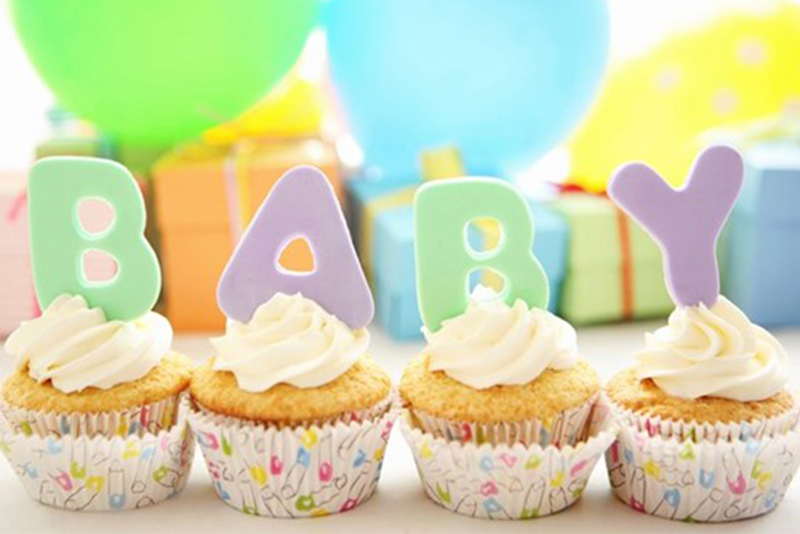
It is believed that the confinement period carries traditional practices to help new mothers recover from the rigours of pregnancy and childbirth.
Copyrighted Pregnancy & Baby by Mummys Market 2019


